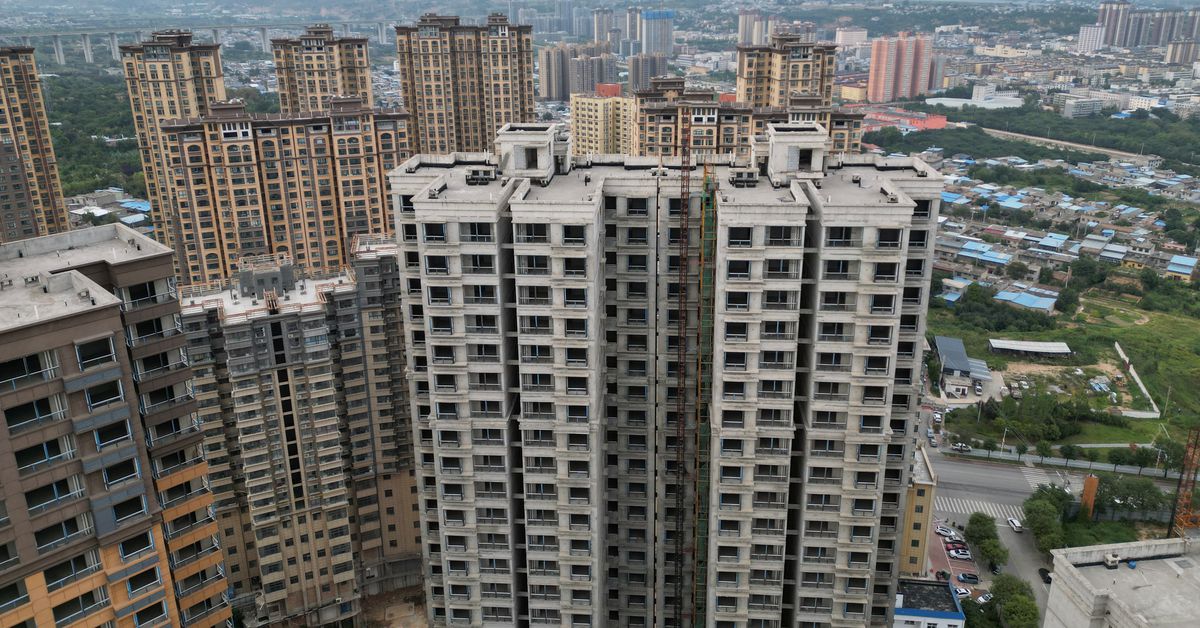Even China’s population of 1.4 billion would not be enough to fill all the empty apartments littered across the country, a former official said on Saturday, in a rare public critique of the country’s crisis-hit property market.
China’s property sector, once the pillar of the economy, has slumped since 2021 when real estate giant China Evergrande Group (3333.HK) defaulted on its debt obligations following a clampdown on new borrowing.
Big-name developers such as Country Garden Holdings (2007.HK) continue to teeter close to default even to this day, keeping home-buyer sentiment depressed.
As of the end of August, the combined floor area of unsold homes stood at 648 million square metres (7 billion square feet), the latest data from the National Bureau of Statistics (NBS) show.
That would be equal to 7.2 million homes, according to Reuters calculations, based on the average home size of 90 square metres.
I find it interesting that everyone is calling this bad management when it’s indicating one thing above all:
Productivity has well exceeded the requirements of the population.
People simply don’t need to work that hard anymore, but all industrialized societies, even would-be socialists, simply can’t stand the idea of letting the working class have leisure time.
UBI and robust social safety nets should have started with the industrial revolution. Every time a machine, computer, or now robots, UBI should have increased and been given to more people.
Tax the automation!! Have companies pay employee taxes for self scanners and all automation. Let the workers live, let the machines work.
I look at my own country of Portugal with a massive realestate prices bubble were more than half the youths only leave their parent’s home after they’re 30, more than 50% of recent graduates emigrating when they get their degrees and schools in certain areas lacking teachers because houses there are too expensive for a teacher salary, and think that maybe what China has there is actually good thing, not a bad thing.
Yeah, sure, “investors” are suffering, but why should the other 99% of people care?!
The world is really lucky that China’s not doing that great at the moment. Not so long ago, China was winning the propaganda war internationally.
You don’t want authoritarianism to win the argument by out-performing democracies.
Why doesn’t China count as a democracy? People vote and the votes get counted and decide who runs things.
Nah. China’s urbanization rate is currently 65%. South Korea for comparison has 82% urbanization rate. So the Chinese have plenty more (say, a hundred million or so more) homes to build. The current difficulties are more to do with (i) loss of consumer confidence caused by the leadership’s bad economic management, and (ii) the deliberate restriction of credit to developers because of the government’s concerns about debt.
This analysis reminds me of the hoo-hah about China’s “ghost cities” circa 2010. Those ghost cities ended up being filled up.
There are still vast ghost cities in that country, so no they don’t actually all fill up
Enough of them filled up that even the press outlets that pushed the ghost cities narrative most aggressively, like Bloomberg, have run follow-up stories acknowledging it.
Yes, some developments worked out and others didn’t, but building out housing in advance of increasing urbanization is a good thing, not a bad thing. It’s how you avoid housing unaffordability in urban centers, or worse, the rise of slums.
Building housing 15 or 20 years ahead of time isn’t a good thing. When people move in, the places are already old. Apartment buildings deteriorate over time even with no one living in them. It’s clearly wasteful to build them that early and there’s definitely a huge property bubble in China.
It’s not 15 or 20 years ahead of time, though. The “ghost cities” came alive within only a few years; for example, this page points to Zhengdong New District, which was singled out as a ghost city by 60 Minutes in 2013. It had a population of 5 million seven years later. For district development (as opposed to constructing a single building), seven years is nothing.
Coming back to their current property crisis: let’s assume the article is correct that there’s an excess of 7 million homes. We can plug this into China’s current urbanization rate, and suppose China will get to South Korea’s urbanization rate in 20 years (that’s roughly how far they’re behind SK, by GDP per capita). At one home for every 3.5 people, they need 3.4 million homes per year on average. So they have overshot by about 2 years, which is hardly going to make buildings crumble.
When you make the only safe place for money real estate, then your corrupt Politicians make that only safe for the wealthy and connected, you end up with a lot of empty useless real estate.
Are you talking about China or Toronto?



